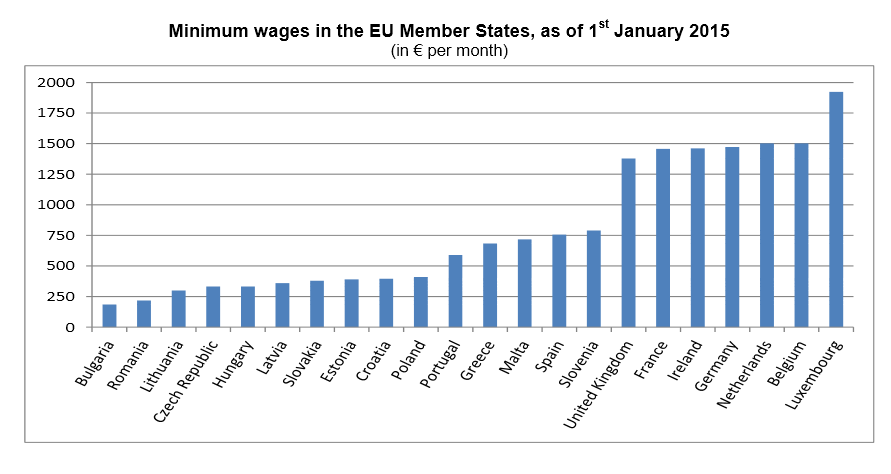Eurostat’s report on minimum wages in the EU showed that a total of 22 member states had national minimum wages in January 2015 ranging from 184 euros per month in Bulgaria to 1,923 euros per month in Luxembourg. When adjusted for differences in purchasing power the disparity between member states are reduced from a ratio of 1 to 10 in euro to a ratio of 1 to 4 in purchasing power standards.
For those countries where the national minimum wage is not fixed at a monthly rate (i.e. Germany, Ireland, France, Malta, the United Kingdom and the United States) the level of the minimum wage is converted into a monthly rate according to a standard number of hours worked per month that may differ across countries2 . The 22 EU Member States that have national minimum wages can be divided into three main groups based on the level in euro. In January 2015, ten Member States had minimum wages below €500 per month: Bulgaria (€184), Romania (€218), Lithuania (€300), the Czech Republic (€332), Hungary (€333), Latvia (€360), Slovakia (€380), Estonia (€390), Croatia (€396) and Poland (€410). In five other Member States, minimum wages were between €500 and €1 000 per month: Portugal (€589), Greece (€684), Malta2 (€720), Spain (€757) and Slovenia (€791). In the remaining seven Member States, minimum wages were well above €1 000 per month: the United Kingdom2 (€1 379), France2 (€1 458), Ireland2 (€1 462), Germany2 (€1 473), Belgium and the Netherlands (both €1 502) and Luxembourg (€1 923). For comparison, the federal minimum wage in the United States2 was just over €1 000 per month (€1 035) in January 2015.Minimum wages between 40% and 60% of the median earnings Minimum wages may also be measured in relative terms, i.e. as a proportion of the median gross monthly earnings6 . In 2010, minimum wages as a proportion of median gross monthly earnings were below 60% in all Member States for which data are available, being lowest in the Czech Republic and Estonia (both 40%), Spain (41%) and Romania (42%), and highest in Portugal and France (both 60%). Minimum wages decreased compared with 2008 only in Greece Compared with 2008, minimum wages in 2015, expressed in national currency5 , increased in every Member State having a national minimum wage, except Greece where they dropped by 14% and Ireland where they remained unchanged. The highest increases between 2008 and 2015 were registered in Romania (+95%), Bulgaria (+64%), Slovakia (+58%) and Latvia (+57%).
Ask me anything
Explore related questions






